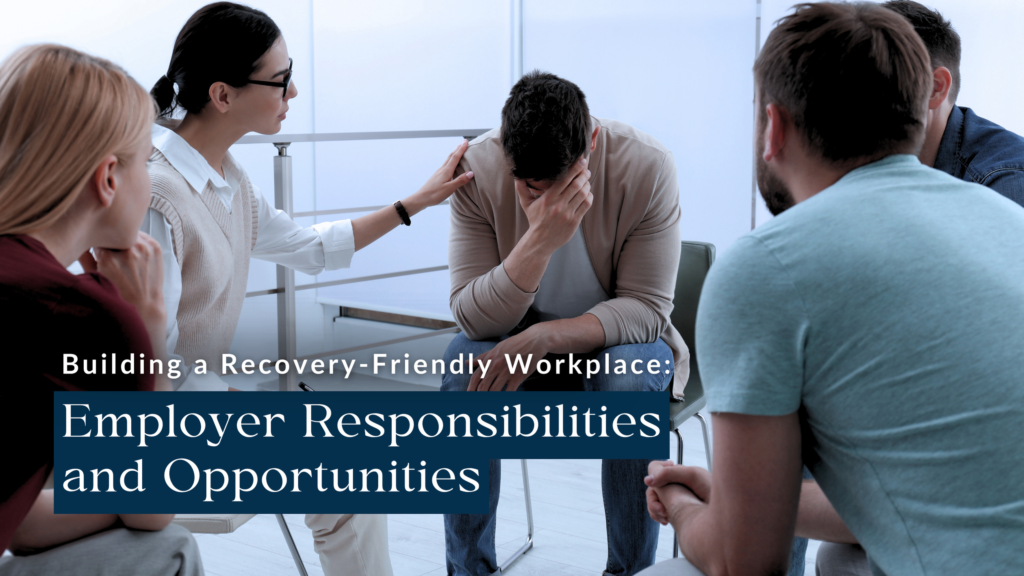
There’s a common misconception that supporting recovery-friendly workplaces means endorsing substance use. Not only is this categorically false, but it’s a harmful mistaken belief that eventually becomes a barrier— preventing employees from accessing the support they need to overcome their addiction(s).
Supporting employees in recovery isn’t about condoning addictive behaviors. It’s about recognizing that addiction is a medical condition that requires support, much like any other health issue.
When we create a safe space where employees can openly seek help without fear of stigma or discrimination, we provide a lifeline to those who are struggling and empower them to rebuild their lives.
Keep reading to learn more about how this approach can benefit your organization and make a lasting impact on your employees.
What is a Recovery-Friendly Workplace?
A recovery-friendly workplace is any professional environment that supports employees who are currently in or seeking recovery from substance use or mental health challenges.
Why Supporting Employees in Recovery Matters
- Nearly 74,000 deaths attributable to substance use occurred in 2020 alone (Source)
- The average lost productivity cost per employee with addiction is $589—an increase of 16.2% since 2007 (Source)
- 14% of Canadians miss work or call in sick at least once per week due to alcohol or drug use (Source)
- Approximately 21% of Canadians (about 6 million people) will meet the criteria for addiction at some point in their lives. (Source)
Employer Responsibilities
In Canada, employers must meet the legal and regulatory requirements, as set forth by the Canadian Human Rights Commission, when addressing addiction in the workplace. Failure to meet these obligations could result in fines and other punitive measures.
Examples of employer responsibilities include:
1. Being Respectful, Compassionate, and Non-Judgemental
Addiction is recognized as a disability under the Canadian Human Rights Act, and employers must accommodate it like any other health condition. This includes taking a supportive approach that reduces stigma, fosters recovery, and ensures a healthier, more inclusive workplace.
2. To Provide Reasonable Accommodations
Employers are legally obligated to make adjustments in an effort to support employees in their recovery efforts. This includes making confidential resources available to the person, granting time off for therapy appointments, or protecting the employee’s role while they attend a treatment program.
3. To Gather and Consider Relevant Medical Information
Employers must request and review all the medical information available to them. Employees struggling with addiction deserve to have their needs understood, and the proper review of medical information promotes a fair, compassionate response while protecting both the employee’s rights and workplace safety.
Employer Opportunities
There are many positive outcomes associated with supporting substance use recovery in the workplace. Knowing what these outcomes are, and how they help drive the accomplishment of larger business goals, is essential for any employer looking to achieve (and maintain) long-term organizational success.
The opportunities for a recovery-friendly workplace include:
1. Employee Retention and Productivity
Losing employees is costly in more ways than one. The recruitment process is time-consuming, often taking weeks or even months to find a suitable replacement. Then comes the onboarding phase, where new hires must be trained, which can disrupt team dynamics and hinder performance.
This is where a recovery support program changes everything. Employees are more likely to stay with companies that support their personal and professional journeys. Plus, by reducing the stigma around addiction and mental health, a recovery-friendly workplace allows individuals to fully engage in their roles without the fear of judgment.
2. Cost Savings
Supporting employees in recovery doesn’t just save you money by reducing turnover rates—it also prevents unplanned absences and reduces the overall healthcare costs associated with untreated substance issues.
Take on-the-job accidents, for example. They’re much more likely to occur when an employee’s judgment is impaired—leading to higher medical costs and workers’ compensation claims.
Additionally, untreated substance abuse contributes to more frequent emergency room visits, hospitalizations, medical leaves, and long-term treatment programs, which drive up insurance premiums for the entire organization.
3. Risk Reduction
Substance misuse poses serious risks to any professional environment. More specifically, it can lead to legal risks for employers if substance use is linked to accidents, harassment, or other incidents. Workplace-supported recovery is one of the best ways to mitigate these risks. It helps businesses remain compliant while reducing the likelihood of discrimination claims, wrongful termination lawsuits, workers’ compensation claims, and other unwanted issues.
Be the Change: Offer Hope and Recovery Resources to Your Team
The recovery process is never easy, but it’s far more difficult when it’s faced alone. By providing resources and a supportive environment, you empower your employees to reclaim their health and focus, which in turn boosts their productivity and dedication.
Don’t wait for the problem to escalate. We’re here to help you reduce stigma, transform lives, and create an environment where success is inevitable. Ask about our corporate training sessions and our commitment to improving employee mental health.
